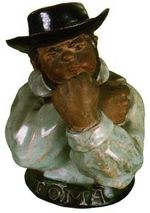Zé Povinho
Zé Povinho , originally developed as a comical caricature of the typical Portuguese , is now considered a personified national symbol in Portugal. He is also known as João Bítor and is generally a great lover of fine dining.
Development and properties
The figure was mentioned for the first time on June 12, 1875 in the fifth edition of A Lanterna Mágica , a satirical argument about a planned tax increase. The figure was depicted as a simple, poor country dweller who is exempted from the authorities excessively by exploiting stupidity and threatening state power. This representation was continuously developed in the subsequent editions. After all, Zé Povinho was portrayed as a person who is resigned to corruption and injustice, gives in to the burden of taxes and duties and is therefore ignorant of the social issues of the time. The publisher's owner Rafael Bordalo Pinheiro said of the character: "O Zé Povinho olha para um lado e para o outro e ... fica como semper ... na mesma" ( "Zé Povinho looks from right to left and ... stays as always ... with the same " ).
Despite the intellectual simplicity, Zé Povinho is considered a figure full of contrasts. He is characterized as tolerant, loyal, hospitable, mild, calm, hardworking, apathetic, indifferent, skeptical, incredulous and solitary. At the same time, however, Zé Povinho can also be rebellious, restless, grumpy, angry, sensitive, compassionate, brave, active and socially very committed.
Web links
- Zé Povinho, Museu Bordalo Pinheiro (Lisbon) , English, on museubordalopinheiro.pt, accessed on October 16, 2014
- Documentation O "Zé Povinho" de Rafael Bordalo Pinheiro from 2011
